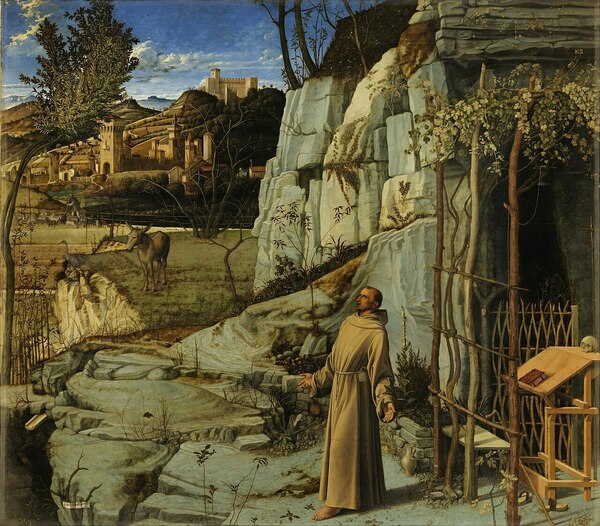The Course

The first section of the course will focus on understanding what we mean by the word “nature.” We’ll consider what “nature” means for human culture, looking at the relationships between nature, place, and identity, and exploring different approaches and dispositions humans take toward the nonhuman world. Your primary assignment will be to read Jeff VanderMeer's novel Annihilation, and then write a short critical essay (1250–1500 words) on the idea of nature in that book.
In the second section of the course, we’ll talk about climate change, environmental justice, the Great Acceleration, Laudato Si’, and the Anthropocene, looking at some of the ethical and spiritual problems posed by climate change, and asking how we might make sense of our predicament in narrative. You will complete several short writing assignments, and one longer personal essay or "confession" (1500–2000 words) about how your faith or non-faith shapes your relationship with nature.
Along the way, we’ll look closely at several examples of long-form, research-driven journalism, which will provide models for your final paper, which is the focus of the third and final section of the course. The final paper will be a 3000–6000 word research-based creative nonfiction essay oriented toward the general reader, on some specific aspect of climate change, addressing in some respect the ideas of “nature,” the “human,” faith or norms, and “integral ecology.” Creative responses utilizing innovative literary techniques are encouraged. Through the last weeks of the course, you will build your story piece by piece, writing a pitch, an outline, an annotated bibliography, and a first draft, then revising that draft through rigorous peer workshop.
Witnessing Climate Change Learning Goals
Scientific Literacy
- Gain knowledge of the fundamental concepts and processes behind “ecology,” “climate change,” and “the Anthropocene.”
- Learn how to understand scientific claims about climate change within a social and normative context.
- Be able to translate scientific claims into general language and communicate them effectively.
- Develop a sense of historical context for climate change and ecology, including an appreciation of how our current scientific understanding of climate change fits in with past developments and future aspirations.
Literary Analysis
- Perform a close analysis of the structural components of a work of literature, and be able to read an artistic text in order to understand what it delivers as a way of knowing.
- Understand what factors shape the creative process, and what sort of decisions writers need to make in the act of producing an aesthetic experience.
- Situate literary works in reference to the relevant historical contexts and compare how the arts represent those periods and cultural frameworks in reference to other contemporaneous ways of knowing, particularly with regard to ideas of nature, the human, climate change, and ecology.
- Apply different critical frameworks for understanding the creation and reception of works of literature.
Catholicism and the Disciplines
- Be familiar with the context, background, and arguments for Pope Francis’s 2015 encyclical, Laudato Si’, and understand the concepts of “integral ecology” and “care for creation.”
- Engage fundamental questions about Catholicism, ecology, and climate change, and develop capacities to think critically and to speak and write effectively about matters of faith in relation to environmental issues and climate change in a pluralistic world.
- Critically examine normative questions within a Catholic framework from scientific and literary perspectives, and scientific and literary questions from a distinctively Catholic perspective.
- Reflect on (or discover elements of) their own faith or non-faith and describe the extent to which various claims are supported by faith and/or reason, and defend a position on selected issues of faith or normative questions raised by environmental crisis and global climate change.
Writing for the Public
- Understand the expectations that characterize public writing about science and the natural world, and use this understanding to produce complex and well-supported writing, applying integrated knowledge gained from different perspectives and/or disciplinary lenses.
- Conduct library research practices in multiple fields appropriate to general nonfiction writing on climate change.
- Write sentences, paragraphs, and papers that are grammatically correct and syntactically coherent, and use flexible strategies for organizing, revising, and proofreading writing of varying lengths and genres.
- Cultivate style as a strategy of holding and directing a reader’s attention in an ethical, collective experience of imagination and cognition.
Integration
- Work together to help produce compelling writing.
- Articulate aspects of different bodies of knowledge or contrasting perspectives around a complex question, problem, or issue.
- Synthesize knowledge and/or methods from varied disciplines or from experiential learning.
- Apply integrated knowledge gained from different perspectives and/or disciplinary lenses.
Witnessing Climate Change is part of a broader Environmental Humanities Initiative working across the Notre Dame campus that seeks to foster innovative undergraduate education, scholarly research, creative endeavor, and institutional diversity on critical environmental issues, through a comparative humanities perspective foregrounding questions of ethics and meaning.